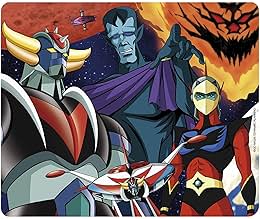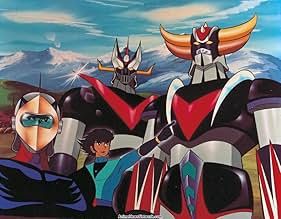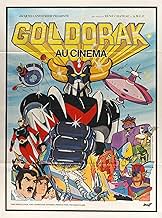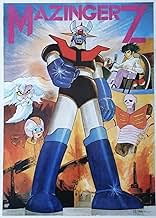CALIFICACIÓN DE IMDb
8.4/10
2.7 k
TU CALIFICACIÓN
Escapando de las malvadas fuerzas de Vega, el joven Príncipe del planeta Fleed abandona su destruida patria a bordo del OVNI Robot Grendizer, una poderosa máquina de guerra, y consigue llega... Leer todoEscapando de las malvadas fuerzas de Vega, el joven Príncipe del planeta Fleed abandona su destruida patria a bordo del OVNI Robot Grendizer, una poderosa máquina de guerra, y consigue llegar a la Tierra.Escapando de las malvadas fuerzas de Vega, el joven Príncipe del planeta Fleed abandona su destruida patria a bordo del OVNI Robot Grendizer, una poderosa máquina de guerra, y consigue llegar a la Tierra.
Explorar episodios
Opiniones destacadas
OK, the animation may be stiff and the characters cardboard, but this show carries great memories for thousands of people around the world. Mildly successful in Japan, "Grendizer" aka "Goldorak" or "Goldrake" was one of the first Japanese cartoons to achieve such great success and retain a cult following for such a long time. Even today, the struggle of the hero Actarus (aka Duke Fleed) against the evil hordes of "Great Strateguerre" Vega give me shivers down my spine! BTW, among the corny aspects of the show, which add to its appeal : why the heck does Vega keep sending his giant robots ONE BY ONE (gettings their asses kicked by Grendizer episode after episode) instead of sending them all in one big assault? Beats me. Talk about a lousy galactic overlord! Seeing a Grendizer episode is like a fountain of youth to me ! I just can't get enough of its cheesy charm!
I grew up watching this anime in Arabic and I can still watch it today. Please note that the English dubbed version of this anime is horrible and I would claim it is unwatchable. It was so bad that the translations were canceled after about 8 episodes (out of 72) I believe. If you want to see this anime, get the original Japanese with English subtitles and avoid the dubbed version like the plague.
I really believe that this cartoon helped shape my personality somewhat because it introduced me to the idea of heroes in a clear and direct way. Daisuki is a clean cut hero similar to Superman in the Western world, except in a giant robot. He always did good and never wavered which I believe is a good lesson to teach kids. Unlike Supes however, Daisuki had to get his hands dirty and there was a lot of killing in this show. The deaths usually happen during battle with the bad guys getting blown up. There is nothing overly gross or graphic so don't worry about questionable content however bad guys do die in this show as do some not so bad guys. I don't know about you, but I hate how western cartoons have degenerated to be politically correct. They end up breeding soft kids who are easy prey for bullies and whatnot. I don't think there is anything politically correct about avoiding human violence to a minimal degree and if anything it is good to show how a hero should behave in the face of wrong. Note that I am about as liberal a person as you will find and I think that this show is perfect for kids. People are too quick to forget that nations are founded by those who fight, not those who get run over or run away. The world already has too many underachieving ninny whiners and I am tired of it. Its important to have courage and not be passive in the face of evil people so you can bet your petuty that my kids will be watching this anime as they get older.
Grendizer is a lot better than many modern anime and cartoons but its old. This was made in the 70's so you cannot expect modern quality animation. The show is also a bit repetitive but so are many other TV shows, cartoons and anime so I don't didn't knock it down too much for that. I really do wish that this anime is remade to modern technology and with deeper script but for now, this gets the job done.
I really believe that this cartoon helped shape my personality somewhat because it introduced me to the idea of heroes in a clear and direct way. Daisuki is a clean cut hero similar to Superman in the Western world, except in a giant robot. He always did good and never wavered which I believe is a good lesson to teach kids. Unlike Supes however, Daisuki had to get his hands dirty and there was a lot of killing in this show. The deaths usually happen during battle with the bad guys getting blown up. There is nothing overly gross or graphic so don't worry about questionable content however bad guys do die in this show as do some not so bad guys. I don't know about you, but I hate how western cartoons have degenerated to be politically correct. They end up breeding soft kids who are easy prey for bullies and whatnot. I don't think there is anything politically correct about avoiding human violence to a minimal degree and if anything it is good to show how a hero should behave in the face of wrong. Note that I am about as liberal a person as you will find and I think that this show is perfect for kids. People are too quick to forget that nations are founded by those who fight, not those who get run over or run away. The world already has too many underachieving ninny whiners and I am tired of it. Its important to have courage and not be passive in the face of evil people so you can bet your petuty that my kids will be watching this anime as they get older.
Grendizer is a lot better than many modern anime and cartoons but its old. This was made in the 70's so you cannot expect modern quality animation. The show is also a bit repetitive but so are many other TV shows, cartoons and anime so I don't didn't knock it down too much for that. I really do wish that this anime is remade to modern technology and with deeper script but for now, this gets the job done.
Cult series across France, Belgium, Italy, Quebec, as well as some part of the Arabic world, like Tunisia. The show was a huge hit for children growing in the late 70s or early 80s. Adults may find it somewhat repetitive, unless they have an interest for anime and mangas. It has been designed with a target audience of 5 and 6 y.o. boys in mind.
Crappy English tranlastions can account for part of its lack of success in the English-speak world. One UK translation is supposed to be correct, more respectful of the original.
A web search should reveal more than a few fan sites. The series ran on French tv (FR2, FR3 and TVA) from 1978 to 1989.
A lot more imaginative than what most shows offer today--although its not a family show, just a children show. ;-)))
Crappy English tranlastions can account for part of its lack of success in the English-speak world. One UK translation is supposed to be correct, more respectful of the original.
A web search should reveal more than a few fan sites. The series ran on French tv (FR2, FR3 and TVA) from 1978 to 1989.
A lot more imaginative than what most shows offer today--although its not a family show, just a children show. ;-)))
Being in North America, I only got 26 episodes of the whole series as a kid. The only reason I remember it is because of the "movie" we rented so often, where Jim Terry Productions had taken scenes from several eps and cut them together, with some fresh voiceovers.
I just got hold of the entire series in Japanese with English subs this year. I had NO idea it had so many underlying themes, like belonging, protecting the environment, learning to rely on others, PTSD, and more. And Hikaru/Brenda's story arc was awesome.
My only gripes are the 70s-style comic relief. Danbi/Panhandle is annoying as hell, whether in English or Japanese. Boss is annoying, and Banta/Carlos usually is, too. It is also very plot-driven, e.g., Koji/Lance lights sticks of dynamite to free Hikaru from a seaweed trap...underwater. And sometimes Duke Fleed/Orion Quest uses the spazer to tag-team against a foe, and sometimes he doesn't. That sort of thing.
But was also the predominant way of writing cartoons back then. That they tackled such heavy themes as the after-effects of war on a person really surprised me.
Oh! One other thing that was so beautiful: almost every episode ends with a view of the sun, either direct or as a background. It was a lovely touch to show that this show is Japanese.
The American version that I watched as a kid erased almost all signs of the show's actual location. Given the American-style ranch, it was easy to do. And although I haven't watched the full French series yet, I've noticed the erasure, too, where possible. Heck, even the subtitles of the Japanese original that I have sometimes erase "Japan" or "Japanese" for English speakers.
But to demonstrate with actual dialogue from the scene in ep 1 where Koji lands his TFO at the ranch:
1. Japanese original: Koji confirms he's Japanese (he says, "Nihonjin"), not an alien.
2. American dub: "I'm more human than you are!" 3. French dub: "I'm a friend."
So, all in all, a beautiful series that's tons of fun, and you can hear the voice actors having fun while they're at it.
"Grendizer, go!"
I just got hold of the entire series in Japanese with English subs this year. I had NO idea it had so many underlying themes, like belonging, protecting the environment, learning to rely on others, PTSD, and more. And Hikaru/Brenda's story arc was awesome.
My only gripes are the 70s-style comic relief. Danbi/Panhandle is annoying as hell, whether in English or Japanese. Boss is annoying, and Banta/Carlos usually is, too. It is also very plot-driven, e.g., Koji/Lance lights sticks of dynamite to free Hikaru from a seaweed trap...underwater. And sometimes Duke Fleed/Orion Quest uses the spazer to tag-team against a foe, and sometimes he doesn't. That sort of thing.
But was also the predominant way of writing cartoons back then. That they tackled such heavy themes as the after-effects of war on a person really surprised me.
Oh! One other thing that was so beautiful: almost every episode ends with a view of the sun, either direct or as a background. It was a lovely touch to show that this show is Japanese.
The American version that I watched as a kid erased almost all signs of the show's actual location. Given the American-style ranch, it was easy to do. And although I haven't watched the full French series yet, I've noticed the erasure, too, where possible. Heck, even the subtitles of the Japanese original that I have sometimes erase "Japan" or "Japanese" for English speakers.
But to demonstrate with actual dialogue from the scene in ep 1 where Koji lands his TFO at the ranch:
1. Japanese original: Koji confirms he's Japanese (he says, "Nihonjin"), not an alien.
2. American dub: "I'm more human than you are!" 3. French dub: "I'm a friend."
So, all in all, a beautiful series that's tons of fun, and you can hear the voice actors having fun while they're at it.
"Grendizer, go!"
The 3rd of Go Nagai's mecha, Grendizer carries over much of what made Mazinger Z and Great Mazinger successful, but manages to freshen things up. Even though Kabuto Koji is present, it feels a lot more like a standalone series.
The art and the animation are much cleaner than the previous entries in the catalog, often closer to the more polished OVAs. The sound design is also vastly superior.
The silly and often annoying comic relief element is not as omnipresent as it was in Great Mazinger, where Boss is often the focus of attention for much of the episode. In fact, thankfully enough, Boss is only featured in a handful of episodes. Grendizer's own cast of silly characters such as Danbei and Banta is somewhat easier to ignore for the most part. And thankfully, there are no such absurdities as taking crows either.
Even if it's made for kids, the tone is more serious, with romantic and even tragic elements, and the characters have a lot more depth.
And this is reinforced by the extraordinary music of Shunsuke Kikuchi, one of the great Japanese composers of the late 20th century. The score is full of pathos and remarkably dynamic, often reminiscent of Ennio Morricone. The music alone gives much more depth to the series than what you find in Mazinger Z and Great Mazinger.
Of course, the series has its share of fillers but overall it is very enjoyable.
I would recommend watching it in Japanese if you do have that option, as the progression of the series makes more sense. The translated versions can sometimes feel as though they were done in batches of a few episodes, without any real notion of the overarching plot. That being said, I grew up watching it in French, and I can attest that they did a fantastic job with that version, despite some issues. I assume that the same goes for the Arabic and Italian versions, seeing how beloved this series remains in France, Quebec, Italy and some Arab countries almost 50 years later.
The art and the animation are much cleaner than the previous entries in the catalog, often closer to the more polished OVAs. The sound design is also vastly superior.
The silly and often annoying comic relief element is not as omnipresent as it was in Great Mazinger, where Boss is often the focus of attention for much of the episode. In fact, thankfully enough, Boss is only featured in a handful of episodes. Grendizer's own cast of silly characters such as Danbei and Banta is somewhat easier to ignore for the most part. And thankfully, there are no such absurdities as taking crows either.
Even if it's made for kids, the tone is more serious, with romantic and even tragic elements, and the characters have a lot more depth.
And this is reinforced by the extraordinary music of Shunsuke Kikuchi, one of the great Japanese composers of the late 20th century. The score is full of pathos and remarkably dynamic, often reminiscent of Ennio Morricone. The music alone gives much more depth to the series than what you find in Mazinger Z and Great Mazinger.
Of course, the series has its share of fillers but overall it is very enjoyable.
I would recommend watching it in Japanese if you do have that option, as the progression of the series makes more sense. The translated versions can sometimes feel as though they were done in batches of a few episodes, without any real notion of the overarching plot. That being said, I grew up watching it in French, and I can attest that they did a fantastic job with that version, despite some issues. I assume that the same goes for the Arabic and Italian versions, seeing how beloved this series remains in France, Quebec, Italy and some Arab countries almost 50 years later.
¿Sabías que…?
- TriviaWas dubbed to Arabic by (the Lebanese TV company) in Lebanon in the early 80's under the name (Moghamart al Fadaa) and gained a huge popularity among the children, teenager and adults as being one of the first Anime series to be completely dubbed to Arabic.
- ConexionesEdited from SF Saiyûki Starzinger (1978)
- Bandas sonorasUfo Robot
(Italian Version)
Written by Luigi Albertelli, Ares Tavolazzi and Vince Tempera (as Vince Tempera)
Performed by Cosmic Connection
Selecciones populares
Inicia sesión para calificar y agrega a la lista de videos para obtener recomendaciones personalizadas
- How many seasons does UFO Robo Grendizer have?Con tecnología de Alexa
Detalles
- Fecha de lanzamiento
- País de origen
- Sitio oficial
- Idioma
- También se conoce como
- UFO Robo Grendizer
- Productoras
- Ver más créditos de la compañía en IMDbPro
Contribuir a esta página
Sugiere una edición o agrega el contenido que falta

Principales brechas de datos
By what name was UFO robo: Gurendaizâ (1975) officially released in India in English?
Responda





















